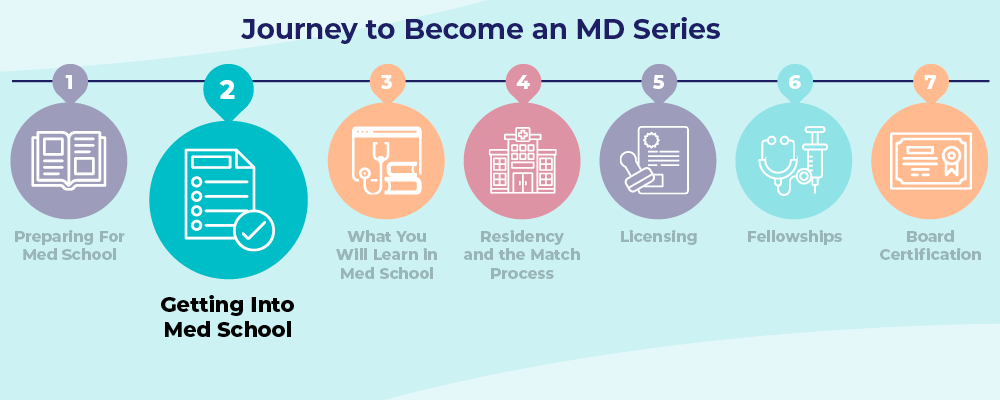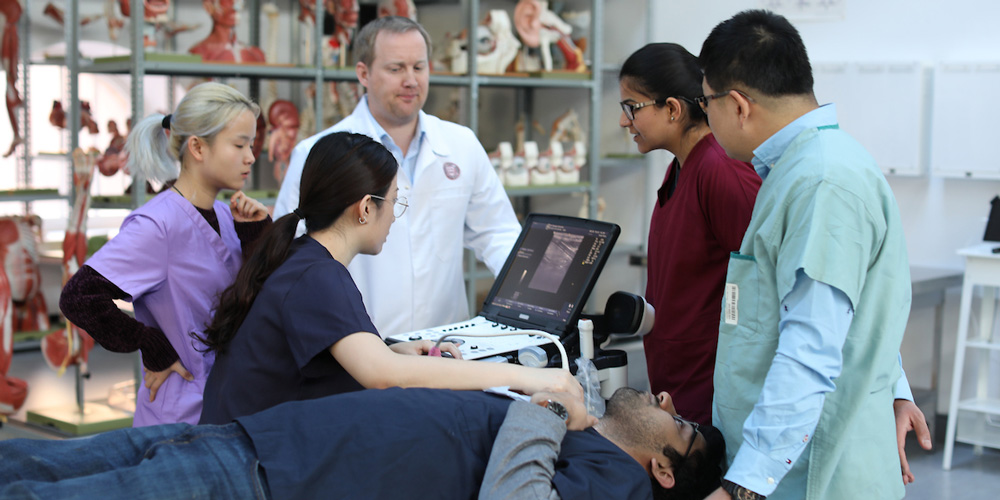
Applying to medical school is a big step that requires careful planning and attention to detail. Applications for Doctor of Medicine (MD) programs have several components and steps.
The medical school application process covers a lot of ground. You spend time perfecting your MCAT performance, selecting your top schools, gathering letters of recommendation, and then completing your primary applications.
Understand deadlines
Most medical schools use the American Medical College Application Service (AMCAS). This program opens for submissions in early May and transmits applications to schools by late June for programs that start in the fall.
However, due to rolling admissions, submitting your application early can be advantageous. Deadlines for primary applications are usually by October, but earlier is better. Some universities also have additional classes that start in January and April.
Letters of recommendation
Before your application process even begins, you can create relationships with doctors, teachers or mentors who can attest to your academic abilities, character, and suitability for a career in medicine. These relationships are the foundation for the letters of recommendation needed for medical school.
The number and breakdown of different types of recommendation letters can vary substantially from one school to the next, so make sure you research individual programs. Although these recommendations can come from several sources, most students focus on getting a physician-authored letter. Even with a physician recommendation, don’t forget that a high level of familiarity is important and will help them write a letter that will stand out.
Secondary applications
After submitting the primary application, medical school will often a send students additional application questions — commonly referred to as “secondaries.”
Medical school secondaries are used to assess whether a candidate will be a good fit for a particular school’s vision and goals. For most MD programs, all applicants will receive secondary applications. The length and format of these will vary—some consist of a handful of yes/no questions while others ask for multiple full-length essays.
Interviews
For the applicants who meet the program’s criterion, they are invited for interviews. These can occur anytime from the fall to early spring. Medical school interviews can be intimidating—especially when it feels like your future career as a doctor is on the line.
However, you’ll need to start getting used to answering some challenging questions. After all, a strong medical school interview performance is commonly a determining factor in getting accepted into med school. Admissions teams will also use these interviews to assess your communication skills that aren’t as easy to determine with exams or transcripts. It is also a chance for them to get to know more about you and your desire to become a doctor.
But don’t let the high stakes stress you out too much. There are quite a few things you can do to prepare for your medical school interviews.
What happens if you don’t get in
You may feel disheartened if you’ve been rejected from medical school, but that doesn’t mean you should give up.
Gaining an acceptance letter is hard for just about every applicant. But if you know you’re destined to be a doctor, trying a different approach when reapplying can make all the difference.
A good next step is to thoroughly evaluate your application. Start by reviewing your academic metrics. If you find that you’re far below those benchmarks, you might want to think about enrolling in some additional coursework to boost your GPA or retaking the MCAT to see if you can increase your score.
Medical school application resources
Staying organized and adhering to application timelines is key. Keep track of each school’s requirements and deadlines and prepare your materials well in advance.
To help you gain a better understanding of medical school application requirements, we have a few blog posts that give more details about each part of the process.
General questions
- 7 questions about medical school applications
- AMCAS application advice for aspiring medical students
- 4 ways to strengthen your medical school application
- ‘What medical schools should I apply to?’ How to create your list [Infographic]
- How many medical schools should I apply to?
- 7 common mistakes medical school applicants make
- ‘Will I get into medical school?’ Understanding your odds
- Medical School Admission Requirements (MSAR): What is it and how does it work?
- Medical school admissions advice: resources to help you prepare
- 8 questions you should be asking the medical school admissions team
- Caribbean vs. US medical school: which one is right for you?
- Caribbean medical schools questions and answers: ultimate list
Timing
- Planning your medical school application timeline: The pre-med student’s guide
- Understanding the medical school application process
- When do medical school applications open?
- What are medical school secondaries?
- On a medical school waitlist? Why holding out might be a mistake
- 5 advantages to starting medical school in January
- Why starting medical school in January made all the difference
Letters of recommendation
- Medical school letters of recommendation: who should write them and what should be included?
- 8 tips for securing great letters of recommendation for medical school
Interviews
- How to prepare for medical school interviews: Steps for success
- 10 medical school interview questions all future MDs should expect to answer
Reapplying
- Reapplying to medical school: How to succeed the second time around
- I’ve been rejected from medical school … now what?
- How many times can you retake the MCAT? Important considerations for retaking the exam
Loans and paying for school
Although it is not directly part of the application process, assessing your ability to pay for medical school is often part of determining where you will apply for medical school. We included a few resources to help you understand your options.

